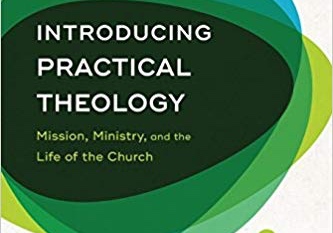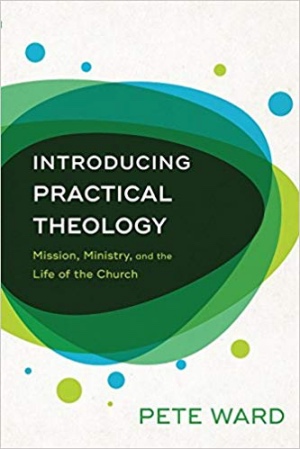
DARREN CRONSHAW looks at an introductory guide to practical theology…
Pete Ward,
Introducing Practical Theology: Mission, Ministry, and the Life of the Church
Baker Academic, Grand Rapids, Michigan, US, 2017.
ISBN-13: 978-0801098192

“Ward introduces a breadth of practical theology scholarship, but unashameably seeks to reframe the discipline, notably in grounding it ecclesially in its relevance for the mission and ministry of local churches.”
What is practical about theology, and what is theological about ministry practice? These are basic questions of practical theology, but also of other disciplines interested in integrating academic reflection with church ministry practice.
Whether in the discipline called “practical theology”, in broader theological study or in everyday life, practical theology is any thinking that takes practice and theology, according to Professor Pete Ward. A professorial fellow in ecclesiology and ethnography at St John’s College, Durham University, Ward worked in youth ministry for 20 years and since 1996 has taught and supervised in practical theology, youth ministry, popular culture and ecclesial ethnography. He draws on this rich background to both introduce practical theology to students and beginning researchers, and to share with other practical theologians his vision for best practice in the field.
Introducing Practical Theology offers readers an introduction to seminal writers in the field, a discussion of key topics, and signposts for navigating contemporary debates. Each chapter is accessible and thought-provoking and deserves comment to illustrate the book’s breadth and relevance.
Chapter one conceptualises practical theology as the church’s ordinary life, refreshingly reminding us that practical theology is done all the time by ordinary believers attentive to how the gospel story engages with their church and everyday lives.
Chapter two establishes practical theology as “faith seeking understanding” (borrowing from Saint Anselm); or a field that takes seriously practice and theology, woven together with spiritual life and prayer. On the latter connection, I especially appreciated Ward quoting Evagrius of Pontus commenting that a theologian is someone who prays truly, and someone who prays truly is a theologian; reminding us that theological reflection and Christian spirituality are mutually enriching.
Chapter three discusses what Ward characterises as a “conservative” treatment of the Gospel and practical theology focused on doctrine and divine action exemplified by Andrew Root, and a more “liberal” treatment starting with experience exemplified by Bonnie Miller-McLemore. Ward invites readers to consider where their practical theology starts, but ultimately continues his appeal to hold experience and doctrine together. Interestingly, he appeals for a return to “applied theology” that is as content to start with Scripture and tradition and look at experience, just as much as starting with experience and then looking to other sources.
Chapter four explores how theology is embodied in “lived religion”, “ordinary theology” and the “four voices of theology”, which all helpfully pays attention to theology in its complexity, contradictions and performance.
The conversation between practice and theology that epitomises practical theology is explored further in chapter five from the perspective of different theories, in chapter six from the perspective of frameworks for theological reflection such as the pastoral cycle, in chapter seven from the perspective of other theological disciplines and social sciences, and in chapter eight around the concept of “culture” particularly from the perspective of mission studies, contextualisation and theological study of popular culture.
The final two chapters are especially relevant for practical theology (or mission studies) research students. Chapter nine offers practical advice for small projects involving empirical research. Ward appeals for researchers to prioritse attentiveness and “priestly listening” for what God is doing in our selves and in our communities. He summarises various data collection techniques and steps for moving from an open-ended but focused research question with a manageable scope through to methodology, human research ethics, data analysis and conclusions.
Chapter 10 broadens the product of practical theology as encompassing transformation of individuals and communities anywhere – through lived experience, activism, prayer, singing and preaching, as well as writing. The final ten guidelines for writing practical theology offer invaluable advice for determining genre, planning, context, structure, method and purpose of a project – prayerfully aiming for transformation for yourself, others church and society.
The book is highly recommended reading for ministry practitioners and students and researchers of practical theology (or by extension mission studies or other fields interested in integrating theology with the practice and experience of mission and ministry). Ward introduces a breadth of practical theology scholarship, but unashameably seeks to reframe the discipline, notably in grounding it ecclesially in its relevance for the mission and ministry of local churches. It will become core reading for my students, especially as they prepare for research projects.
This review was originally published in Crucible Theology & Ministry 8:2 (Nov 2017), https://www.crucibleonline.net/vol-8-2-november-2017/.





